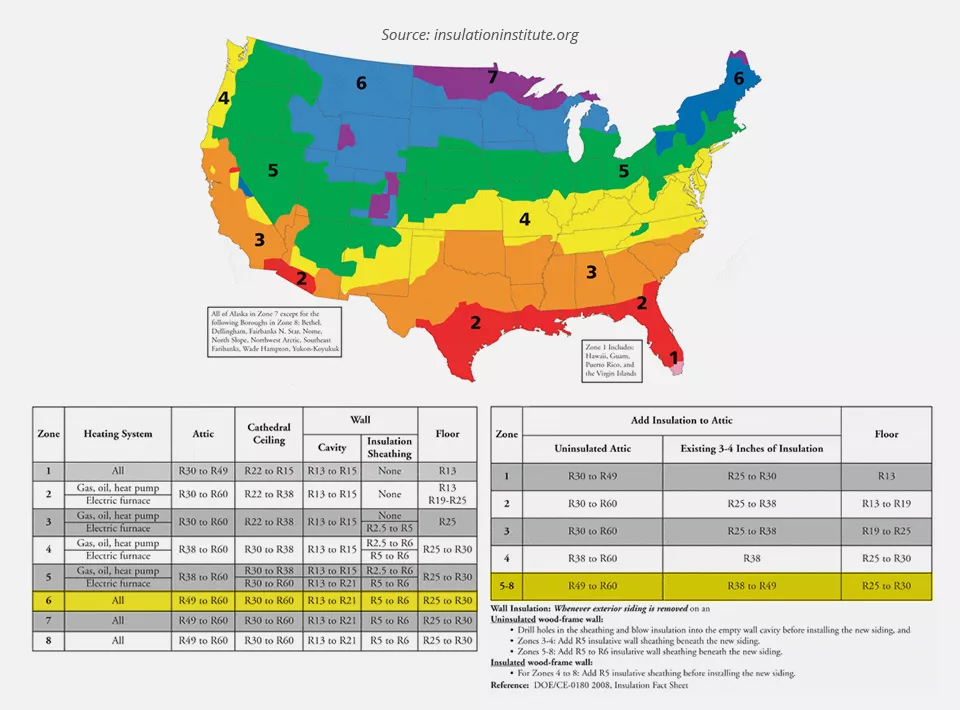- Serving Wisconsin Since 1972!
- |Contact Us
How Much Insulation Does Your Home Need?

When it comes to energy efficiency, nobody’s home is perfect. However, one of the most effective ways to improve your home’s energy efficiency and stay comfortable year-round is to install insulation.
As you’re getting ready to insulate your home, you’ll most likely be wondering how much insulation you need. The amount of insulation your home will need depends primarily on two factors:
- The R-value recommended for the region you live in.
- The areas of your home that need to be insulated.
Understanding these factors can help you determine what insulation is best as you schedule insulation installation for your home.
Need help determining the type or amount of insulation in your home? Contact us today.
How To Determine the R-Value You Need
You may have heard of R-value for insulation, but why is it important? Understanding what R-value is and how the recommended R-value is determined are both important when insulating your home.
What Is Insulation R-Value?
R-value is the measurement of a particular material’s resistance to conductive heat flow. Put simply, R-value measures how well something resists heat. The greater the heat resistance, or R-value, the greater the insulation’s effectiveness.
What R-Value Do I Need?
The R-value needed depends on the insulation’s type/material, thickness and density. Although a higher R-value generally means a more effective insulator, the highest R-value possible may not be right for your project. This can be true if the space you’re insulating already has insulation.
Additionally, houses in certain climates don’t need as much insulation as others. For example, homeowners in Florida don’t need to worry about insulating against extremely cold temperatures — but the weather here in Wisconsin is quite different.
That’s why different regions of the U.S. have different recommended insulation levels. The Sheboygan County area (and central and southern Wisconsin) is in Zone 6.
Recommended R-values in this region range from R-5 to R-60, depending on the area being insulated.
What Areas of My Home Need Insulation?
There are several places you should consider insulating in your home, as insulation can help reduce energy costs, maintain more even temperatures in your home and serve as a sound barrier.
The most common areas to insulate in your home are the:
You can put new insulation over old insulation in some cases, but there are times you may need to consider insulation removal before installing new insulation.
It can be challenging to figure out where your home needs insulation removal and insulation installation, but don’t worry. An insulation professional can help you determine the areas that need insulation and their proper R-value.
Types of Home Insulation
When deciding on insulation for your home, there are several types to choose from. Some of the most common are:
Each type of insulation has its advantages, and your insulation contractor can walk you through which type will be best for your home.
Contact us for a free quote if you’re ready to begin your insulation project in Sheboygan, Milwaukee or Madison.
The Benefits of Each Type of Insulation
Batt & Blown-In Insulation
Fiberglass insulation, which has been used in homes for decades, is available as loose-fill or batts. Fiberglass is made of tiny glass fibers and is often installed in attics but can also insulate walls and crawl spaces.
Cellulose Insulation
One of the most environmentally friendly materials, cellulose insulation consists of up to 85% recycled material. It can be installed in any area of a home.
Spray Foam
Typically made of polyurethane, spray foam insulation is applied wet and expands into thick foam. Spray foam can be installed in crevices and hard-to-reach areas and can help reduce air infiltration.
Rigid Foam Board
Popular for its ability to reduce utility bills and maximize energy efficiency, rigid foam board is a great choice for insulating your office building or home.
There are three types of rigid foam board insulation:
- Polyisocyanurate (polyiso): Polyisocyanurate rigid board insulation typically comes with reflective foil facing on both sides. This makes it ideal for the attic, as the foil helps your home reflect the sun’s energy rather than absorb it.
- Extruded polystyrene (XPS): Extruded polystyrene rigid board panels have smooth, plastic surfaces and are extremely durable.
- Expanded polystyrene (EPS): EPS rigid board insulation can be used for new construction projects and re-insulating.
Ready to reap the benefits of rigid foam, cellulose, blown-in or spray foam insulation in your Wisconsin home? Contact Alpine Insulation for a free quote.
Questions About Insulation in Your Wisconsin Home? Call Alpine Insulation
Want to know more about your insulation options or need to schedule insulation installation in your home? We can help! Alpine Insulation offers quality building and insulation services in Wisconsin.
Contact Alpine Insulation today for insulation in central or southern Wisconsin. Call (920) 458-8188 to learn more.
Areas We Serve in Wisconsin
We provide insulation services for commercial and residential buildings in:
- Sheboygan, WI
- Menomonee Falls, WI
- Appleton, WI
- Weston, WI
- Madison, WI
- Eau Claire, WI



